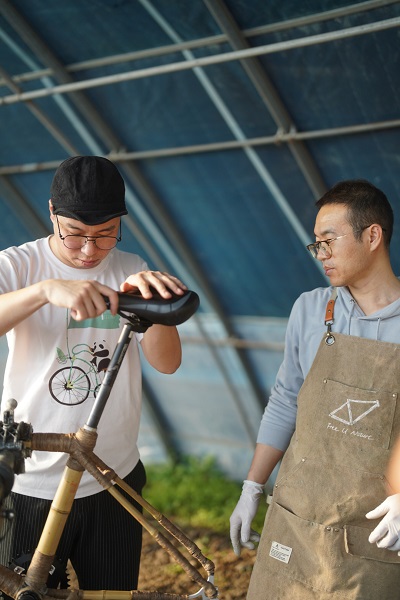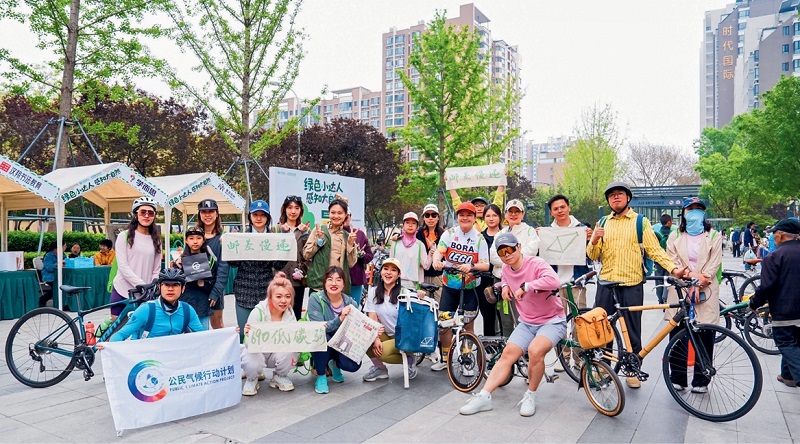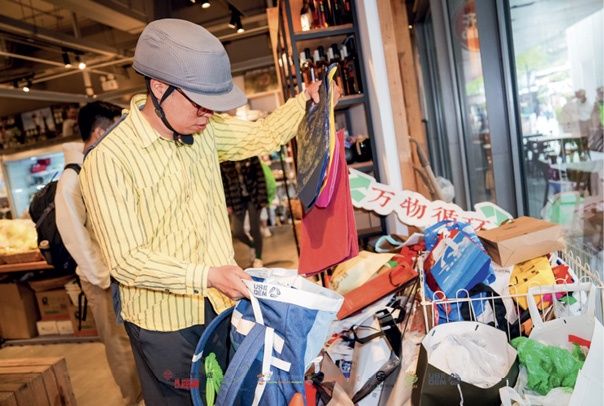Two environmentalists using bamboo bicycles to promote green transportation.

Jia Qiong (left) and Zhang Zhichao (right) make a bicycle out of bamboo.
The exhaust emissions generated by transporting the world’s population on a daily basis are one of the main sources of greenhouse gases. Vehicles such as cars, subways, and motorcycles, all produce carbon emissions. The bicycle, invented more than 230 years ago, is the only vehicle that does not produce any carbon emissions while being riden.
Jia Qiong and Zhang Zhichao are two cycling enthusiasts who co-founded Free U Nature (FUN), a bamboo bicycle studio. It is dedicated to promoting green transportation in response to global warming. The two men help like-minded people to handcraft the main structure of green bicycles made of bamboo, and monthly cycling activities are organized to inspire bamboo peddlers to promote green travel.

Riders pose for a group photo at the first event of the postman project in Beijing on April 20, 2025.
Awareness of Environmental Protection
Jia’s awareness of environmental protection can be traced back to his childhood. Growing up in northeast China, he experienced severe weather such as sandstorms and smog, and often saw reports about white pollution through TV programs. Eager to do something positive to ease the pollution, in junior school he began to organize his classmates to pick up and recycle plastic bottles. He also took the initiative to pick up litter that was thrown around the area where he played.
During his college years, Jia read a story in China Campus magazine about a Chinese college student who had won praise from the international community for her work in environmental protection. He was inspired by the large-scale impact of an individual effort, and was motivated to do something similar.
At that time, there was a trend for recycling used batteries. He convinced two classmates to collect and extract the recyclables from the batteries. However, after doing more research on the topic, they learned that they did not have the expertise to dispose of the chemicals in the batteries, so subsequently they abandoned the plan.
After graduating from university, Jia moved to Beijing and approached the Bamboo Bicycles Beijing studio, which he also knew from China Campus. David Wang, the American founder, offered workshops for the riders to make the main structure of the bicycles with bamboo, enabling people to have a connection with sustainable materials and get involved in a new lifestyle of green cycling. Jia began volunteering at the studio, eventually becoming a full-time employee. He made many friends along the way and took part in several public welfare activities, educational cooperation projects, and innovation competitions, finding the career he wanted to devote his life to. However, due to personal reasons, Wang disbanded the studio in 2018. Jia sought other jobs in the education industry but he did not find them fulfilling.
Zhang’s interest in environmental protection also began in his school days in northeast China. During high school, after they moved to a new teaching building, he couldn’t find a trash can to throw away garbage. Then he brought it to the attention of the principal. After graduating from university, Zhang moved to Beijing and worked in the field of public welfare.
During a group study project among colleagues, Zhang learned more about climate issues. He realized that some concepts are closely related to people’s daily life, which prompted him to adopt a sustainable lifestyle. He began eating in the dining hall instead of choosing takeouts, and bought second-hand clothes instead of new ones. At his work place, he encouraged his co-workers to put their garbage such as discarded paper, express packaging, and plastic bottles in recycling stations set up in the public area. “At that time, when I went out to eat at restaurants, I would also bring back the plastic wrapping and paper packaging for the chopsticks and dispose of them at the office, which formed the habit of recycling,” Zhang said.
Jia and Zhang met during a public welfare cooperation initiative. Both shared a passion for cycling and handmade crafts. After hearing that Wang had reopened his studio in Shanghai in 2021, they planned to also revive the bamboo bicycle project in Beijing. “Cycling is a way for me to connect with nature. I remember my initial green awareness during my [first bamboo bike] ride from Beijing to Qingdao (a coastal city eight hours’ drive from Beijing). We also hope to inspire more people to participate in the unique experience,” Zhang said.

Jia Qiong delivers paper bags collected during the event on April 20, 2025. Photos courtesy of FUN
Promoting Green Cycling
During a city walk event, Jia learned about the Ling-Long Project initiated by the NGO Friends of Nature (FON), which aims to support Chinese citizens to raise climate action awareness. Jia was attracted by the idea of the project and believed that it was a great opportunity to explore how his personal efforts could create a larger impact on society.
In 2022, Jia joined the third phase of the Ling-Long Project, planning to launch a 690 cycling initiative (cycling 690 kilometers) to attract people to participate in riding bamboo bicycles. At that time, Jia learned how to produce a professional action plan in Beijing, while Zhang learned the bamboo crafting and business model with Wang in Shanghai. “I was inspired by bamboo bicycles and integrated them into eco-friendly living. I hope my efforts can also help more people find the joy and value of cycling,” Jia said.
Jia said that based on a sustainability report released by Trek Bikes, on average, an aluminum alloy bicycle releases about 174 kilograms of CO2 equivalent in the production of raw materials, manufacturing, and transportation, which is equal to the carbon emissions of a car traveling 690 kilometers. Therefore, if a person rides 690 kilometers, it can achieve carbon neutrality for an aluminum bicycle. Meanwhile, the vascular bundle structure in bamboo endows it with tensile strength similar to that of steel. Its service life is the same as that of titanium alloy or steel frames. Also, after being cut down, the rest of the bamboo plant can continue to grow and absorb carbon dioxide, which makes it a practical and sustainable material source.
Zhang said that it takes about three days to make a bamboo bicycle. On the first day, the main frame is built. After selecting the bamboo, they show the riders how to cut it into parts of suitable lengths and connect them together. The next day, they teach riders to reinforce each connection with carbon fiber to make the structure stronger and more stable. On the third day, they help riders connect the main structure to other components, after which the riders polish the entire bike.
Jia and Zhang founded FUN in April 2023, with the goal to advocate practical ways to reduce the burden on nature. Sponsored by FON, they recruited cycling enthusiasts through friends and online platforms. Within six months, they had held 37 cycling events and seven handcraft workshops, rallying more than 150 people to start recording their cycling distance. At last, the total distance of 35,880 kilometers was reached, achieving carbon neutrality for about 52 bicycles with a carbon emissions reduction of almost 93.1 tonnes.
Jia and Zhang were happy to see that in addition to cycling enthusiasts participating in their cycling events, many curious teenagers also took part. “In the process of teaching others, the sense of connection with each other is very real. We think those who have made bamboo bicycles together will become lifelong friends,” Zhang said.
In addition to cycling events, Jia and Zhang also planned other creative activities. Inspired by a sustainable restaurant in Sweden that uses bicycles to deliver takeouts, they launched a slow postman delivery project, integrating cycling with the sharing economy. It calls on people to deliver idle second-hand paper bags to recycling boxes they set in brick-and-mortar stores, and then they recruit postman riders to send the collected bags to retailers for reuse.
The first event of the project was launched in Beijing on April 20, 2025, when 23 postmen carried over 400 second-hand paper bags collected within 12 days from Hotel Jen Beijing. They rode 11 kilometers to deliver the bags to two spots of the Beijing Farmers’ Market, in a bid to give these bags a second life.
“The recycling stations at the hotel were planned to be set up only during the event in April, but then, the organizers decided to transform them into long-term areas. This also shows us that there may be more stores and shopping malls that can house fixed recycling stations in the future. To make the process even more convenient, people could also send the bags to their downstairs recycling stations, which will make it easy for more people to recycle and utilize them,” Zhang said. As a representative of the project, Zhang has also been sponsored by the FON. He said that he will contact more stores and cycling postmen to organize more events to deliver portable materials in the upcoming months.
Over the two years since its establishment, FUN has attracted hundreds of enthusiasts to join their cycling team, with a green ride totaling over 60,000 kilometers, with almost 100 bicycles achieving carbon neutrality. As they continue on their journey to help the environment and keep the planet healthy, Jia and Zhang have a vision to see the whole Beijing become a bicycle city where a sustainable living style prevails.